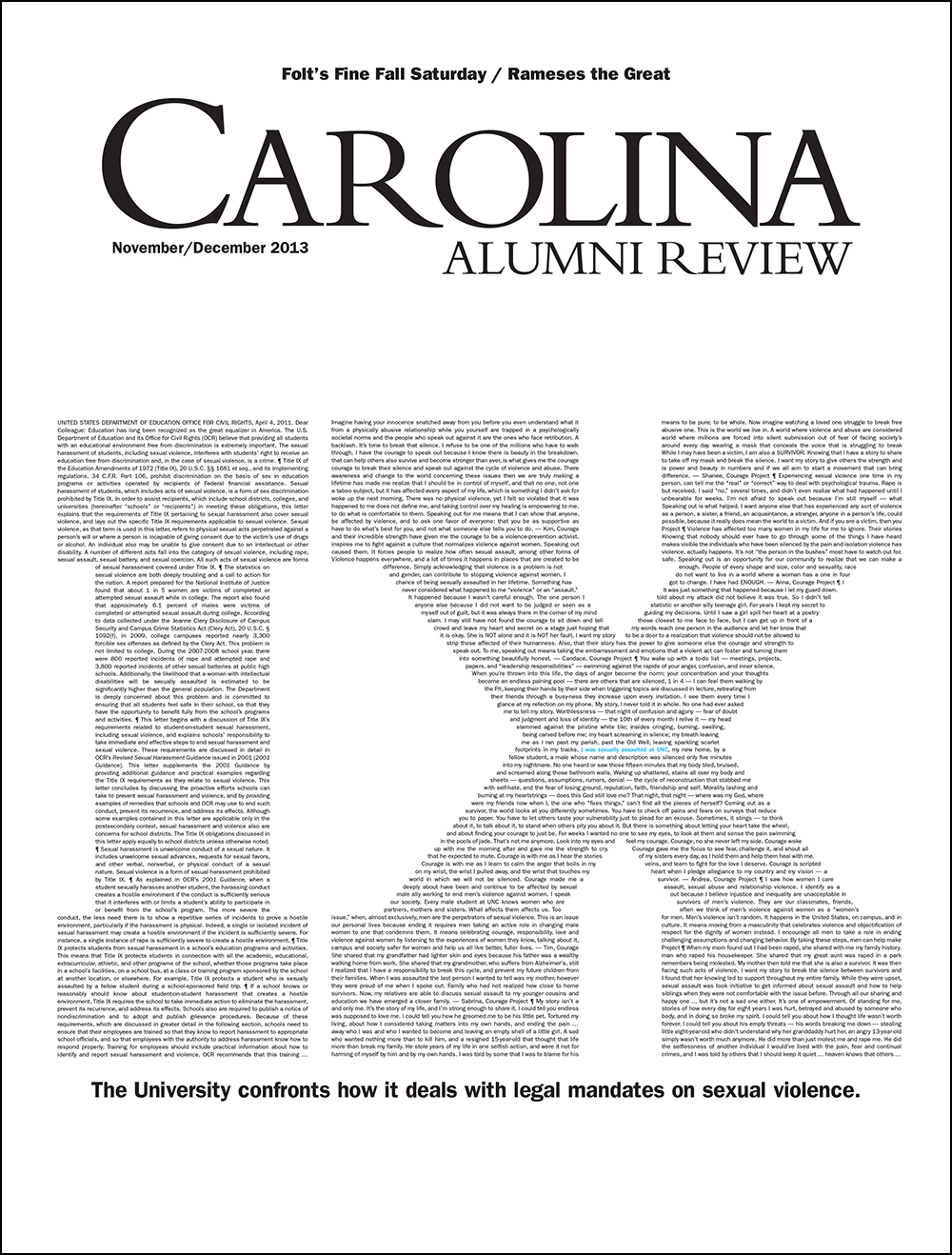Feds Cite UNC for “Serious” Failure on Crime Reporting
Posted on Nov. 19, 2019 | Updated Nov. 20, 2019
In an investigation initiated by complaints over UNC’s handling of sexual assault claims in 2013, the report said the University failed to develop and implement an adequate compliance program. (File photo)
The University has been cited for multiple “serious” violations of the federal Clery Act that requires institutions to report campus crime statistics, resulting in “the institution’s systemic failure to provide students and employees with important campus crime information and services essential to their safety and security.”
In an investigation initiated by complaints over UNC’s handling of sexual assault claims in 2013, the report said the University failed to develop and implement an adequate compliance program, meaning it did not have adequate policies, procedures, programs, training initiatives and systems to comply with federal standards.
“The University has failed to meet its regulatory responsibilities in numerous and serious ways,” the report said. It identifies nine serious violations of the Clery Act that occurred in the 2009 to 2012 review period The review later was expanded to stretch to 2015.
The violations are wide ranging. The University was cited for failure to:
• Issue timely warning for live threats;
• Accurately compile and disclose crime statistics;
• Follow institutional policy in a case of an alleged sex offense;
• Retain records of potentially reportable crimes to the Honor Court;
• Comply with Clery fire safety requirements; and
• Apply Clery requirements to some buildings off the main campus.
“These findings indicate a general lack of adequate coordination, oversight, and supervision with regard to the University fulfilling its campus safety compliance obligations,” the report said.
“The University has failed to meet its regulatory responsibilities in numerous and serious ways. … These findings indicate a general lack of adequate coordination, oversight, and supervision with regard to the University fulfilling its campus safety compliance obligations.”
— U.S. Department of Education
The report said UNC could face fines for the violations, although it was not specific about penalties.
The charges against the University cannot be appealed, the report said, but it indicated that any future fines could be appealed.
“While we have made many safety improvements and staffing changes since 2013, the shortcomings noted in the review are extremely concerning, disappointing, and do not meet the University’s high standards,” Interim Chancellor Kevin Guskiewicz wrote in a message to the campus community on Monday.
The University acknowledged many of the problems in the 59-page report, and it also disputed some of the government’s claims.
Guskiewicz said UNC has taken some actions “to make our campus safer.” UNC has:
• Engaged a nationally recognized consulting firm for Clery Act compliance matters to help the University assess and recommend how it can more fully comply with federal crime reporting and fire safety rules;
• Developed an enhanced training schedule for UNC Police, including continued training with the Orange County Rape Crisis Center; and
• Established a new position — a vice chancellor for institutional integrity and risk management — to coordinate critical functions that have historically been decentralized, including risk management and enterprise risk management, public safety, environmental health and safety, emergency management, protection of minors and ethics education and policy management.
On Feb. 7, 2017, the U.S. Department of Education notified UNC of the Clery violations. The University submitted its initial response in July 2017 and supplemented it several times through May 2019. The report Guskiewicz revealed on Monday was received in August.
The government’s report paints a picture of a disorganized effort on the part of the University to address the Clery law.
“While we have made many safety improvements and staffing changes since 2013, the shortcomings noted in the review are extremely concerning, disappointing, and do not meet the University’s high standards.”
— Interim Chancellor Kevin Guskiewicz, in a message to the campus community
“Well into 2019, UNC showed that it was unable or unwilling to produce an accurate, complete, fully reconciled and well-organized response to the department’s initial report,” the report said.
“It is abundantly clear that the Department’s intervention was the impetus for substantially all of the remedial steps that were taken by the University and that no such action would have been taken if the agency had not intervened by conducting this review.”
Further, the report said: “The Department followed up with University officials on multiple occasions between October of 2017 and May of 2019 in an attempt to understand the meaning of the University’s submissions. On several occasions, the review team requested additional information that should have been part of the initial submission. Ultimately, none of these efforts were sufficient to resolve all of the discrepancies, errors and omissions that were identified in the response. As a result, the Department was forced to require the University to substantially reconstruct its file review in early May of 2019.
“Due to UNC’s difficulties in preparing its official response, the Department remains concerned about the institution’s ability and willingness to fully comply and as such, will continue to monitor the University’s progress through a post-review monitoring program.”
In spring 2012, a then-sophomore filed a complaint with the student-run honor system that she was sexually assaulted by a former boyfriend. UNC launched a review of policies and procedures for addressing and responding to sexual assault allegations, removed sexual assault cases from the Honor Court’s jurisdiction, and began to beef up its staff for dealing with such complaints. In December of that year, five women filed complaints with the federal Office of Civil Rights, saying UNC did not handle sexual assault complaints properly and did not report assault statistics to the government properly.
The OCR has cited UNC for violations it found related to those claims, which also triggered the Clery investigation.
With regard to sexual violence, the report says that “the review exposed serious weakness in UNC’s programs and procedures that were intended to address allegations of sexual violence. And, it is the Department’s position that the complainants in this case were reasonable in their contention and belief that such failures had [a] detrimental impact on the willingness of sexual assault victims to come forward and report crimes and their willingness to seek redress through the University’s disciplinary processes, including the Honor Court.”
The report says UNC failed to review cases in which the act required timely reporting to the public. “As a result, the University never actually evaluated the need for timely warnings in a large number of incidents,” including at least three sexual assaults, two aggravated assaults and a robbery. “In other cases, the file review showed that warnings that were ultimately issued were delayed for as long as 24 hours, during which time the campus community was unaware of potentially serious threats to their safety.”
The report cited UNC for failing to apply Clery standards to a number of off-campus sites, such as Granville Towers, the Hillel Center, the Newman Catholic Student Center, The Daily Tar Heel office, multiple fraternity and sorority houses and Porthole Alley. “A rape that occurred in this alley … in 2012 was not included in campus crime statistics, nor was it reviewed for the issuance of a timely warning,” the report said.
The Clery Act requires institutions to maintain a daily crime log that is available for public inspection and to issue timely warnings and emergency notifications to provide up-to-date information about ongoing threats to the health and safety of the campus community.
UNC was cited for a persistent failure to compile and disclose accurate and complete campus crime statistics for calendar years 2009-12 — 20 specific incidents were described.
UNC was cited for a persistent failure to compile and disclose accurate and complete campus crime statistics for calendar years 2009-12 — 20 specific incidents were described. “Several contributing factors were identified,” the report said, “including a lack of basic policy and procedure, poor report writing practices, inadequate supervisory control of the report writing and approval process, inadequate internal controls over the statistical compilation process, nonexistent staff training (prior to the review team’s first site visit in 2013), weak managerial practices, serious system deficiencies, inadequate communication and coordination between key University offices and external law enforcement agencies, and basic unchecked human error.”
The fire safety violations related to UNC’s failure to include required statistical and prevention information for Granville Towers.
The report said the University “must develop and implement a system of policies and procedure to address and rectify its administrative failings. In addition, the University must develop a comprehensive corrective action plan, which should include institutional self-study directed at identifying the root of its Clery compliance failures and how they can best be rectified.”
The University says it now is providing Clery Act training to dozens of employees, including members of Campus Health Services, the athletics department, housing staff, the Equal Opportunity and Compliance Office, Fraternity & Sorority Life and Community Involvement, the LGBTQ Center and others.
It also has reviewed the requirements for Clery coverage of off-campus University-related buildings and “increased compliance.”
Partly in response to looming investigations, the University in August 2014 implemented a new policy and procedures to respond to and address reports of harassment, discrimination and sexual violence. It developed multiple training programs for students, faculty and staff about sexual assault. It now requires every student to complete the training every year.
More:
• “Reports of Sexual Assault Incidents Rise in New Survey,” October 2019
• “Office of Civil Rights Cites UNC Failures in Handling Sexual Assault,” July 2018
• Student’s Sexual Assault Claim Turns Attention to UNC Policy, September 2016
• University Refines Policies on Sexual Violence, August 2014
• “Sexual Assault and the Law,” cover story, November/December 2013 Carolina Alumni Review
• Task Force to Review How UNC Handles Sexual Assault Complaints, May 2013
• Timeline of Events: An investigation of Handling Sexual Assault Cases, April 2013
• Carolina Creates Full-Time Title IX Post, Names Interim, April 2013
• Feds Will Probe Handling of Sexual Misconduct Case, March 2013

The Review received four CASE District 3 awards related to its November/December 2013 cover story, titled “Sexual Assault and the Law”:
• Grand Award in Graphic Design for the cover, seen at left. (The words inside the “I” of Title IX were from the letter from the U.S. Department of Education warning colleges to improve their prevention of and response to sexual assaults involving students. The words in the “X” were from essays about sexual violence featured in UNC’s The Courage Project.)
• Grand Award in Publications Writing
• Award of Excellence in Best Articles of the Year
• Special Merit Award in Feature Writing
